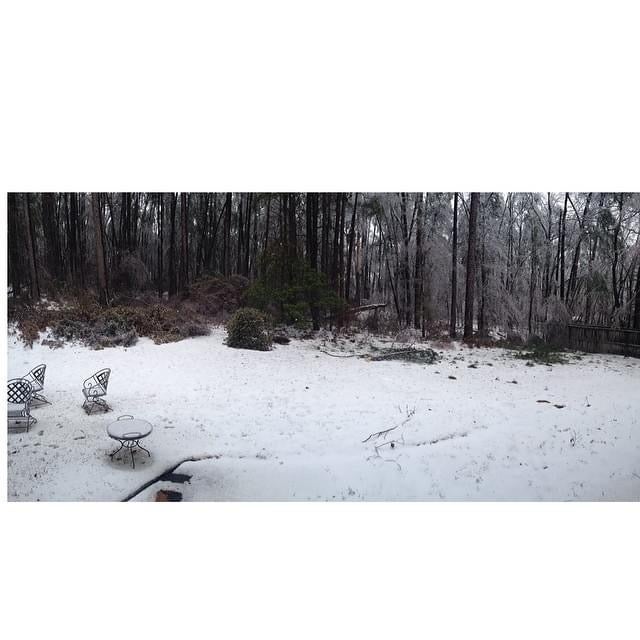Tierney Hall was a nurse at University Hospital, what’s now Piedmont Augusta, during the week of Feb. 12, 2014.
“I remember it being nighttime, and hearing the rain come down, this freezing rain,” she recalls. She and her husband, Perry Hall, were living in the National Hills neighborhood. “I could hear branches just start cracking and falling. Occasionally, a branch would fall and hit a power line and pull the cord out of the transformer, and there would be like a flash of light.”
Winter Storm Pax was sweeping the Atlantic coast and had started hammering the Southeast. In the CSRA, roads were slick with ice and snow, and neighborhoods hurled in the dark by downed power lines.
“I couldn’t tell if it was thunder or if it was transformers,” Tierney Hall said, remembering the sound of a storm, flares of what seemed like lightning, and overburdened trees splitting at the branches. “It was just the most bizarre night. We woke up and just every branch had half an inch of ice all the way around it, everything was just completely encased in ice.”
That first night she couldn’t make it work, the night shift at University, as the driveway was too slippery.
The hospital was using its backup generator to keep power, and offered to pay nurses to stay overnight, sleeping in makeshift bunks on varying floors, stuffing offices with blankets and pillows. It provided nurses with meals and a change of clothes for those who didn’t have one.
“They went back to work that next night and continued to get paid for like two days straight,” Tierney Hall explained. “Which was good because I couldn’t make it in.”
By 11 a.m. the next morning, the ice on the road outside the Halls’ driveway had melted just enough to move the fallen branches in the yard. There was still some light rain, and it was going to freeze again that night. Tierney Hall would go to relieve an exhausted co-worker from a 24-hour shift, to work upwards of 16 hours herself, partly to get away from the cold and the dark.
MORE: 2014 ice storm was lesson in preparation
The couple lived four miles from the Augusta Chronicle News Building downtown, where Perry Hall worked as an accountant. Even though work had been canceled, he said, he braved the storm as well, amid offers of extra pay and vacation time, to charge his phone and keep warm.
“It was nicer being there than in my house,” he said. “After Tierney went to work, I went and like slept in my car. I just turned it on and laid in the driver’s seat and went to sleep.”
The couple also remembers truckloads of broken branches piled into the abandoned ball field at Eisenhower Park, close behind their house, from when the city had started collecting the debris from along the roads throughout town. A mound of tree debris was stacked up to what Perry Hall estimated was about 50 feet.
“They came through with woodchippers,” Tierney Hall said. “It took probably two months to get through… pine trees and sweet gums and oak trees, just huge mounds that are back there and they slowly, one dump truck at a time, pulled all that mulch out.”
Joshua Swarmer had just returned from a trip with his family to Alexandria, Va., and was taking turns with his father, visiting his ailing mother at University Hospital. His father, grandmother and younger sister had checked into a hotel, facilitated by Red Cross, as the power was out at home.
He remembers looking outside a hospital window to see a tree frozen to where it couldn’t support the weight of one of its broken branches and the ice coating it.
“It fell over, and honestly it kind of looked like a kind of baker’s bench,” Swarmer said. “That’s honestly what it looked like, with the ice just shattered all over the ground, and of course when it shatters and it just spreads out all over the place, so it had the tree branch right there in the middle of it.”
The Halls used their gas grill to cook their food, meat that they began leaving outside because it proved more suitable than a powerless refrigerator.
“We were like, let’s eat all our food,” said Tierney Hall. “So everyone was grilling out. I remember the smell of grills lighting because everyone had grills and charcoal.”
Swarmer was already inclined to find something like a silver lining amid the days-long storm. He was inclined to think about the first settlers of the land, and how they would have fared against similar circumstances.
“They went through a lot more than we did and just trying to survive and now here we are with all of our modern conveniences as well as technological advancements,” said Swarmer.
Fascinated by storms, he noted then a kind of splendor in this example of nature at its most intense.
“I was looking at the beauty of it,” he said. “Because honestly, if all you focus on in the world is just the dark side, then you’re never going to see the beauty in the light that’s standing right in front of you.”
Skyler Q. Andrews is a staff reporter for The Augusta Press. Reach him at skyler@theaugustapress.com.











